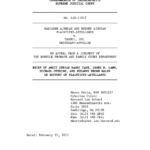Clinic Files Amicus Brief Supporting Family’s Right to Access Dead Relative’s Emails
Blog – Cyberlaw Clinic 2017-02-27
 On February 21, 2017, the Cyberlaw Clinic filed an amicus brief on behalf of several trusts and estates law scholars and practitioners in Ajemian v. Yahoo!, Inc., Mass. Supreme Judicial Court No. SJC-11917. The brief supports the plaintiffs-appellants in the case.
On February 21, 2017, the Cyberlaw Clinic filed an amicus brief on behalf of several trusts and estates law scholars and practitioners in Ajemian v. Yahoo!, Inc., Mass. Supreme Judicial Court No. SJC-11917. The brief supports the plaintiffs-appellants in the case.
The Ajemian case arises out of a dispute between Yahoo and the family of John Ajemian, who died unexpectedly in 2006. After Mr. Ajemian’s death, the administrators of his estate contacted Yahoo about gaining access to his email account. Yahoo refused, claiming that the Stored Communications Act (SCA), 18 U.S.C. § 2701 et seq., prevented it from doing so. Among other things, Yahoo argued that the “lawful consent” exception found in § 2702(b)(3)—authorizing providers to disclose stored communications “with the lawful consent of the originator or an addressee or [the] intended recipient”—requires the express consent of the user. Since Mr. Ajemian died intestate and did not otherwise authorize the post-mortem disclosure of his email, Yahoo contents his estate is forever barred from accessing it. This appeal focuses solely on the question of how to interpret the SCA’s lawful consent provision, and we believe that it is a case of first impression in the United States.
The amicus brief argues that Yahoo’s proposed interpretation of the SCA would frustrate the efficient administration of estates and prevent families from accessing troves of data with financial and sentimental value that are increasingly stored only on the servers of private companies like Yahoo. While acknowledging that the SCA protects important privacy interests, the brief suggests that the court need not read the SCA as dogmatically as Yahoo suggests, especially since the statute was written over 30 years ago and is silent on this particular issue. Yahoo’s reading would create a default rule that anyone who dies “digitally intestate”—that is, without leaving express instructions about what to do with their electronic accounts—wishes their data to forever remain beyond the reach of their relatives. But given the tremendous value of the data we now store with companies like Yahoo, and the fact that all of our other property automatically becomes part of our estate even if it contains sensitive personal information, amici invite the court to hold that the power to “lawfully consent” in life should be entrusted to the decedent’s personal representative after their death. This analysis is based on the legislative history of the SCA and statutory construction of the term “consent,” and it supports the public policy goal of preserving the value of an estate for a decedent’s heirs.
The amicus brief also addresses Yahoo’s alternative argument that its Terms of Service give the company sole discretion to deny access to user accounts or delete content. Given the undeveloped record on this point and the potentially significant ramifications of such a finding, amici urge the court to leave this question for another day.
Special thanks go to HLS Cyberlaw Clinic students Danielle Kehl (HLS JD ’18), Vinitra Rangan (HLS JD ’18), and Xinshu (Sylvia) Sui (HLS JD ’18), who worked closely with Clinical Fellow Mason Kortz and the amici to prepare and file the brief.